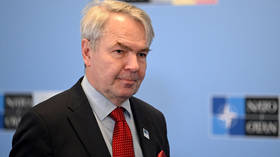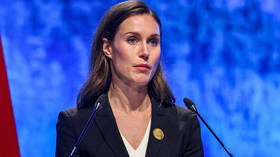
Moscow’s nuclear rhetoric prompted Helsinki to apply to join the US-led military bloc, the Finnish foreign minister has said

Finland’s Foreign Minister Pekka Haavisto arrives for the meeting of the NATO foreign ministers in Bucharest, Romania, on November 30, 2022. © Daniel MIHAILESCU / AFP
Russia’s alleged “nuclear threats” amid the Ukraine conflict were the key factor that spurred Finland to seek NATO membership, the nation’s foreign minister, Pekka Haavisto said on Sunday. Moscow has stated on numerous occasions that it has never threatened to use atomic weapons.
Speaking to Kyodo news agency in Poland on the sidelines of the foreign ministers’ meeting of the Organization for Security and Cooperation in Europe (OSCE), Haavisto said that Russian military action in Ukraine meant “security realities in Europe have changed.”
The minister claimed Russian nuclear rhetoric prompted Finland to think about how it could respond and where it could find support, leading to a decision to seek NATO membership.
In late September, Russian President Vladimir Putin signaled that he would use “all means” necessary to defend the nation if its territorial integrity were threatened, sparking fears in the West that Russia could employ nuclear weapons amid hostilities in Ukraine.

Read more
Senior Russian officials have maintained on numerous occasions that Moscow has never threatened anyone with nuclear weapons. Moreover, Russia’s current defense doctrine allows for a nuclear strike only when the very existence of the state is at risk.
Finland, along with its Nordic neighbor, Sweden, submitted an application to join the US-led military bloc in May, breaking with a decades-long policy of neutrality. While NATO has accepted the requests, the bids must be ratified by all 30 members of the bloc, with the approvals of Hungary and Türkiye still pending.
Haavisto said Hungary had signaled it would give its approval in early February, expressing hope that “during the spring everything will be settled,” including ratification by Ankara.
In October, Turkish President Recep Tayyip Erdogan said his government was ready to greenlight Finland’s entry into NATO but was not prepared to do the same for Sweden, citing “rampant terrorism” in the country. He was apparently referring to the presence of Kurdish groups who are outlawed in Türkiye.
On Saturday, Anadolu news agency reported that Sweden had extradited to Türkiye a man convicted there of being a member of the Kurdistan Workers’ Party (PKK), which Ankara considers a terrorist organization.




